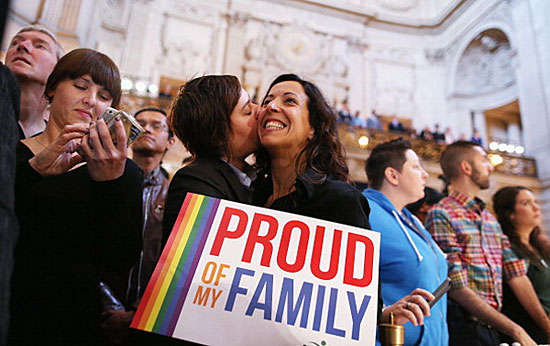Toward a more perfect union
June 26, 2013
All of us—gay or straight, male or female, young or old—achieved an important victory at the U.S. Supreme Court this week, one that speaks to our common humanity in profound ways.
The most obvious beneficiaries of the court’s rulings Wednesday on same-sex marriage are gays and lesbians seeking the right to marry the person they love.
But the court’s essential message was this: Equal justice under the law applies to everyone in our society, without regard to race, religion, sex or sexual orientation. And as such, the court’s decisions are a victory for equal rights for all Americans.
This was especially true in the court’s decision striking down the Defense of Marriage Act, making clear that gays and lesbians are entitled to the same constitutional protections as everyone else. Its action on California’s Proposition 8 was narrower but no less significant, ensuring the right of gays and lesbians to marry here in the nation’s most populous state.
Although more court challenges undoubtedly lie ahead, change is coming—in a big way—as more states join the 13 now recognizing same-sex marriage and the Supreme Court heads inevitably toward a future case that will provide the perfect vehicle for affording this basic constitutional right to all Americans.
The court’s actions this week reflect the swift and remarkable evolution of public attitudes on gay rights and same sex marriage. I can’t think of another issue in my lifetime where we’ve moved so far so fast. The victories of the civil rights movement took generations to achieve but this time, I think, we’re on a quicker pace toward justice.
We’re growing into a more tolerant nation, a nation that believes in live and let live. Millions have figured out, as I did, that heterosexual couples aren’t harmed in any way by same-sex marriages.
Starting now, we can also put to rest a troubling chapter in our state’s history, in which an attempt was made to use California’s constitution to diminish rights, rather than expand them.
As I and others argued during the campaign against Prop. 8, the constitutions of the United States and California have always been used as tools of inclusivity, of empowering people and affirming rights—not for excluding people or exempting them from equal protection.
This vitally important principle has been upheld.
Still, there were disappointments in the high court’s rulings, starting with the 5-4 votes in both decisions.
It’s disheartening that, well into the 21st century, key constitutional rights were upheld by only the slimmest of Supreme Court majorities.
Also, instead of boldly creating a national precedent by ruling Prop. 8 unconstitutional, the justices took a technical way out. They let stand a lower court’s ruling striking down the measure by determining that Prop. 8 proponents weren’t legally qualified to make the challenge.
But imperfect results can still be powerful. As I’ve said before, Ty Cobb only batted .400 and he’s in the Hall of Fame.
And these rulings taken together constitute a giant step forward in our republic’s journey to a more perfect union.
Posted 6/26/13













 405 bridge work causes a stink
405 bridge work causes a stink





